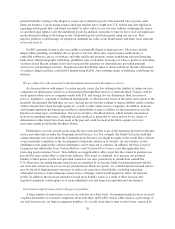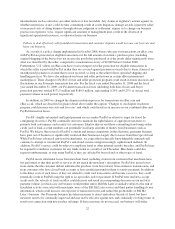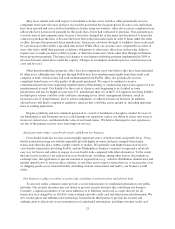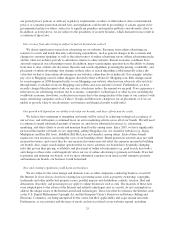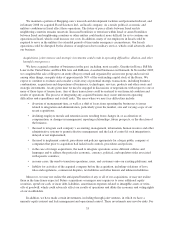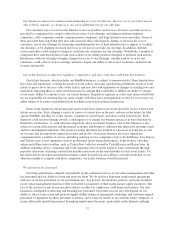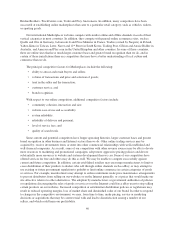eBay 2009 Annual Report Download - page 38
Download and view the complete annual report
Please find page 38 of the 2009 eBay annual report below. You can navigate through the pages in the report by either clicking on the pages listed below, or by using the keyword search tool below to find specific information within the annual report.risk,” primarily the sale of certain types of digital content. For “high risk” merchants, PayPal must either prevent
such merchants from using PayPal or register such merchants with credit card networks and conduct additional
monitoring with respect to such merchants. PayPal has incurred fines from its credit card processors relating to
PayPal’s failure to detect the use of its service by “high risk” merchants. The amount of these fines has not been
material, but any additional fines in the future would likely be for larger amounts, could become material, and
could result in a termination of PayPal’s ability to accept credit cards or changes in PayPal’s process for
registering new customers, which would seriously damage PayPal’s business.
Changes in PayPal’s funding mix could adversely affect PayPal’s results.
PayPal pays significant transaction fees when customers fund payment transactions using credit cards, lower
payments when customers fund payments with debit cards, nominal fees when customers fund payment
transactions by electronic transfer of funds from bank accounts, and no fees when customers fund payment
transactions from an existing PayPal account balance or use buyer credit issued by GE Money Bank. As of
October 2009, eligible U.S. customers may also fund payment transactions through a loan originated by CIT
Bank in the Bill Me Later service, and PayPal will incur no fees for such transactions. Customers fund a
significant portion of PayPal’s payment volume using credit cards, and PayPal’s financial success will remain
highly sensitive to changes in the rate at which its senders fund payments using credit cards. Senders may prefer
funding using credit cards rather than bank account transfers for a number of reasons, including the ability to
dispute and reverse charges directly with their credit card provider if merchandise is not delivered or is not as
described, the ability to earn frequent flier miles, cash rebates, or other incentives offered by credit card issuers,
the ability to defer payment, or a reluctance to provide bank account information to PayPal. In addition, some of
PayPal’s offerings, including the ability to make a limited number of payments without opening an account, have
a higher rate of credit card funding than PayPal’s basic product offering.
PayPal’s failure to manage customer funds properly would harm its business.
PayPal’s ability to manage and account accurately for customer funds requires a high level of internal
controls. In some of the markets that PayPal serves and currencies that PayPal offers, PayPal has a limited
operating history and limited management experience in managing these internal controls. As PayPal’s business
continues to grow, it must strengthen its internal controls accordingly. PayPal’s success requires significant
public confidence in its ability to handle large and growing transaction volumes and amounts of customer funds.
Any failure to maintain necessary controls or to manage customer funds accurately could severely diminish
customer use of PayPal’s products.
System failures could harm our business.
We have experienced system failures from time to time, and any interruption in the availability of our
websites will reduce our current revenues and profits, could harm our future revenues and profits, and could
subject us to regulatory scrutiny. Our eBay.com website has been interrupted for periods of up to 22 hours. In
November 2009, technical systems issues resulted in eBay.com users being unable to search for listed items for a
period of several hours. Our PayPal website has suffered intermittent unavailability for periods as long as five
days, most recently for approximately five hours in August 2009. Any unscheduled interruption in our services
results in an immediate, and possibly substantial, loss of revenues. Frequent or persistent interruptions in our
services could cause current or potential users to believe that our systems are unreliable, leading them to switch
to our competitors or to avoid our sites, and could permanently harm our reputation and brands. Reliability is
particularly critical for PayPal, especially as it seeks to expand its Merchant Services business. Because PayPal is
a regulated financial entity, frequent or persistent site interruptions could lead to fines, penalties, or mandatory
changes to PayPal’s business practices, and ultimately could cause PayPal to lose existing licenses it needs to
operate or prevent it from obtaining additional licenses that it needs to expand. Finally, because our customers
may use our products for critical transactions, any system failures could result in damage to our customers’
businesses. These customers could seek significant compensation from us for their losses. Even if unsuccessful,
this type of claim likely would be time-consuming and costly for us to address.
30


